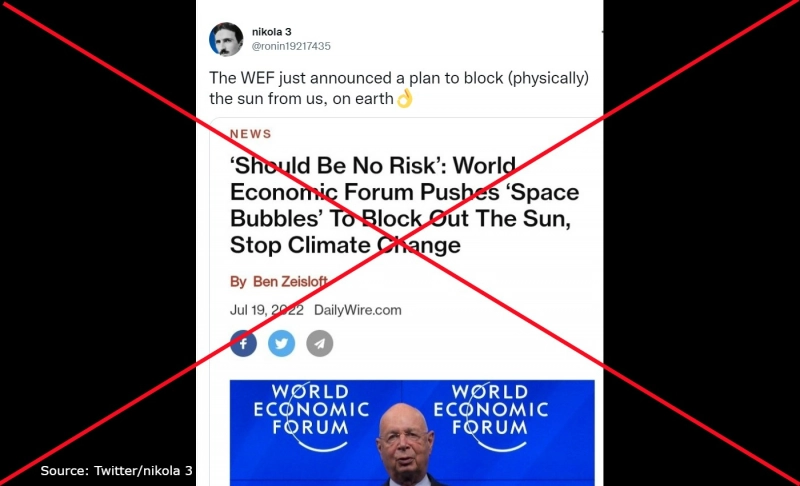By: Ankita Kulkarni
January 31 2023

The WEF has not proposed space bubbles to combat climate change. The forum has only republished a research article that has been misinterpreted.
Context
Following the 2023 World Economic Forum (WEF) summit in Davos, a surge of dubious claims about the event went viral on social media. One Twitter post by a user named "nikola 3" shared on January 16, 2023, claims that the WEF is planning to "block (physically) the sun from us, on earth." The post includes a screenshot of a Daily Wire headline and has over 122.4K views.
However, these claims are incorrect and have misinterpreted the ongoing research.
In Fact
The viral post includes a screenshot of a headline that says, "Should Be No risk: World Economic Forum Pushes Space Bubbles, To Block Out The Sun, Stop Climate Change." The Daily Wire report, published on July 19, 2022, claims that the WEF "recently suggested that 'space bubbles' can be used to block out the sun and thereby reduce climate change." A post republished by the WEF has been misinterpreted and shared with the incorrect claim that the WEF is pushing the idea.
The MIT Senseable City Lab website explains that MIT researchers have been working on a concept to counter climate change where a raft of bubbles made of a thin-film material, such as silicon, would be released into space. These bubbles would deflect solar radiation, acting as a solar shield to help reduce the effects of global warming.
The WEF regularly posts research articles published by other organizations on its blog "Agenda," with a note that they are opinion articles, timely analyses, or explainers from subject matter experts. Anyone can submit a pitch to this WEF blog. On June 20, 2022, the WEF republished an article from Dezeen, which first reported on the study. The blog was published with the headline, "This 'Space Bubble' shield could counter the effects of climate change by reflecting the sun's rays."
Logically reached out to the MIT Senseable City Lab, who clarified that the "WEF is not sponsoring the research and is not involved in this project." It also noted that the project is currently looking into the idea's feasibility and seeking feedback from the broader scientific community. It has not yet been implemented and is still in the proposal stage.
The Verdict
The WEF has not proposed physically blocking the sun to tackle climate change. The ongoing space bubble research by MIT has been misinterpreted, and social media users have falsely linked the study to the WEF. Therefore, we have marked the claim as false.